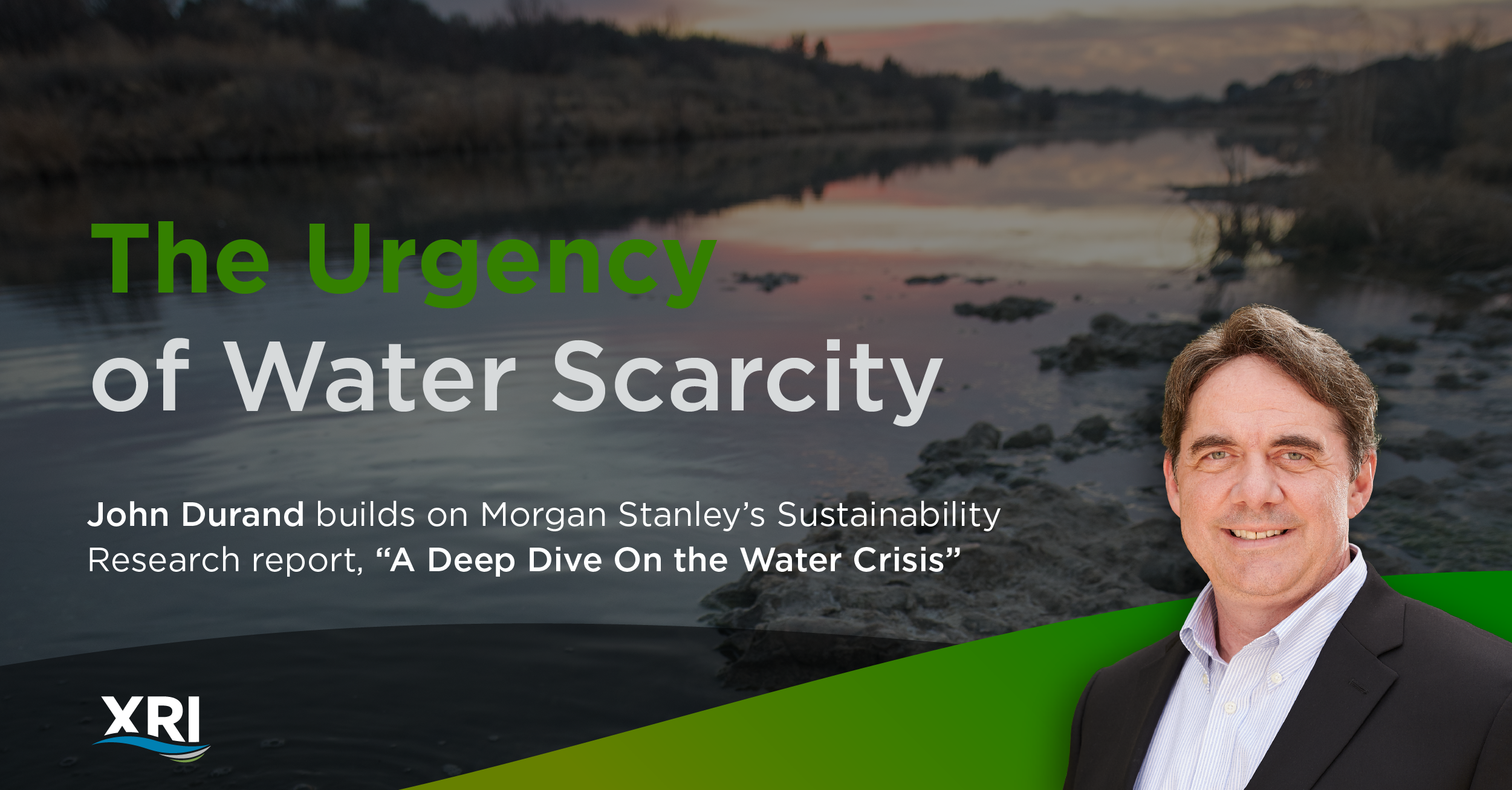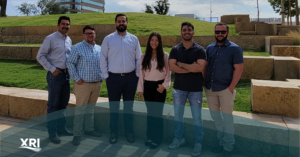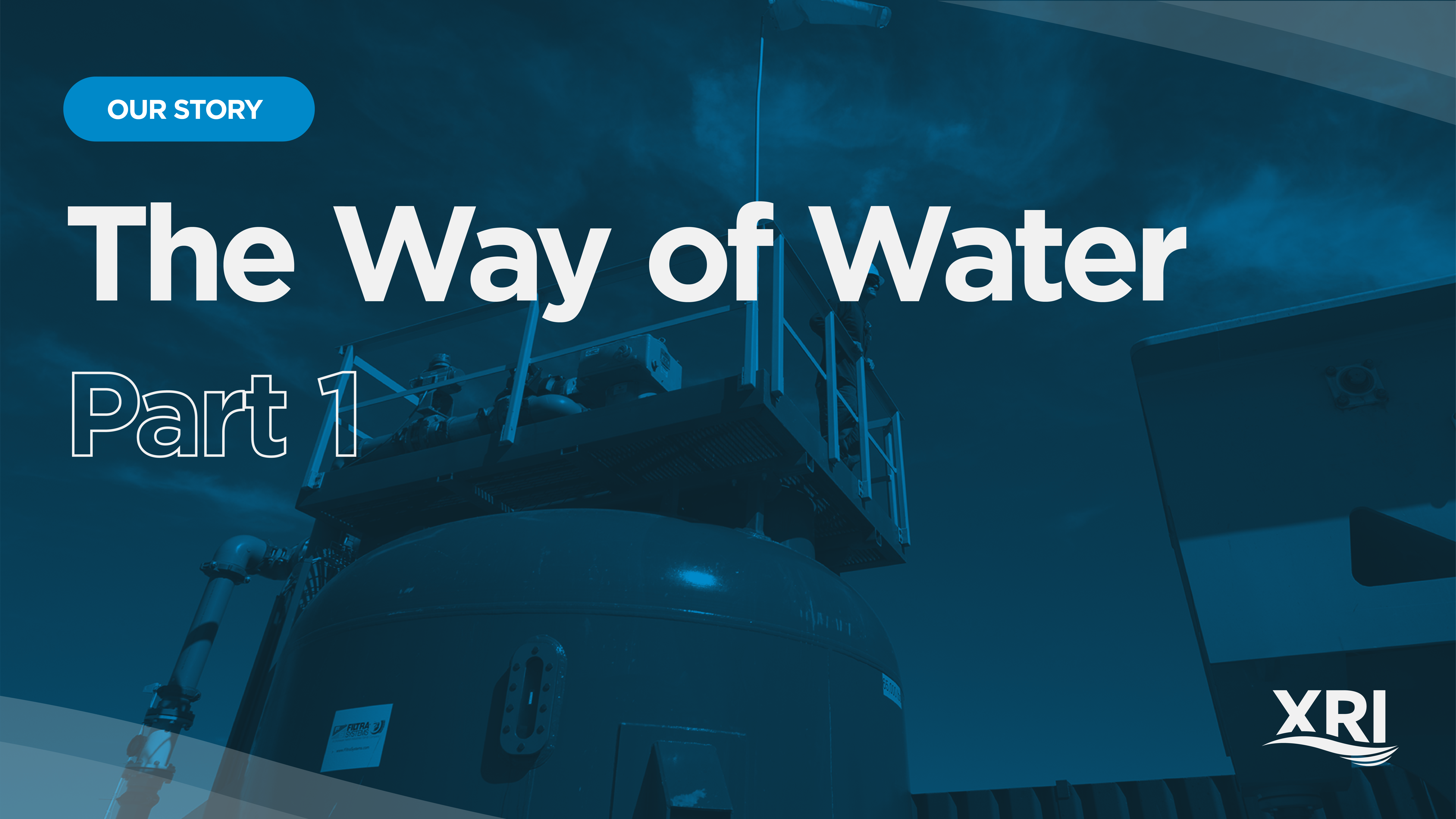John Durand, XRI President & Chief Sustainability Officer, builds on the Morgan Stanley research report, “A Deep Dive on the Water Crisis,” discussing the urgency of water scarcity.
Since focusing my career on water management and conservation of water resources for the energy industry in 2014, I have developed a passion for the importance and urgency of addressing renewable supplies of water for industry and thereby increasing the supply availability of water for human consumption and agricultural irrigation. Recently, I came across a fascinating and important article from the Morgan Stanley Research Team, entitled “A Deep Dive on the Water Crisis,” which I found insightful and particularly relatable to the water sustainability focus of our company, XRI.
The article speaks to the growing importance of addressing water scarcity with a focus on reviewing the causes, implications and solutions required going forward. The research describes that by 2030 the gap between global demand and supplies for fresh water will approach 40%. That is a shocking and troublesome shortfall for any of us to truly comprehend, but according to the research a quarter of the world’s population currently does not have access to fresh drinking water. This growing gap has the potential to impact countries across the globe, not only on a humanitarian level, but also economically as World Bank estimates GDP growth could be impacted by water scarcity in certain regions by as much as 11.5% by 2050.
Solving this global water crisis is a complex and costly sustainability issue that will need to be addressed by investments in infrastructure, technology and well thought out policies. The Morgan Stanley report further describes the multiple challenges for water as a commodity to be effectively priced to reflect its true value and how that value will facilitate the project economics for the considerable future investments in water infrastructure required. Given that global water demand has increased six-fold over the last century, all industries must begin now to address how each can minimize their own consumption and then determine tangible ways to recycle and reuse water resources in a long-term and sustainable fashion. This brings me to what we are doing at XRI in doing exactly that.
XRI was founded on the tenets of conservation of natural resources, environmental sustainability, employee health and safety and corporate stewardship. Our environmental, social and governance (ESG) mission is simple: provide full cycle water management solutions to the energy industry’s leading companies in the safest, most efficient and environmentally responsible manner possible. Our unwavering commitment is to conserve precious water resources for the benefit of people and our communities and minimize the amount of produced wastewater being reinjected into disposal wells.
As the leading full-cycle water resource optimization company focused on the gathering, recycling, and re-use of produced water for the upstream oil and gas industry, we recognize that global energy requirements are expanding and evolving.
Our culture is one that focuses on advancing all facets of ESG compliance within our company as well as with our clients, contractors, and vendors. We are resolute in our commitment to providing industry and sector leading Environmental, Health & Safety (EH&S) programs and results, pipeline system integrity management and pre-emptive maintenance of our assets to protect our employees, the public and
the environment.
XRI is revolutionizing the way produced water is handled, underscoring our position as the standard bearer in the water management sector. We continue to advance innovation and sustainability within the energy industry by:
- Setting the standard for the industry in terms of resource conservation, safety, and stewardship for the benefit of all stakeholders.
- Bridging the gap between operators by leveraging infrastructure and generating efficiencies that result in the accelerated growth of recycled and reused produced water.
- Leading the water midstream industry in taking produced water from one operating company, treating it, and reusing it for multiple operating companies, also known as, “water sharing.”
Progressing sustainability initiatives, reducing the energy industry’s water footprint, and helping our customers achieve their ESG goals is one of our primary objectives. Our commitment to maximize the recycling and reuse of produced wastewater and the implementation of our business model is allowing XRI to better achieve the industry’s overall ESG goals and collectively reduce the energy industry’s
water footprint.
Although XRI is currently focused on preserving freshwater and is the leader in reuse and recycling as it pertains to water management for the energy industry, our sights are also set on promoting and providing the beneficial reuse of recycled water to industries outside of the energy industry. We are proactive and foundational members of the following federal and state associations which seek technology and infrastructure advancement for public and private stakeholders and end-use markets:
- The Department of Energy’s Produced Water Optimization Initiative.
- The Texas Produced Water Consortium.
- The New Mexico Produced Water Consortium.
Through these associations and other industry affiliations, XRI continues its focus on the growing importance of addressing water scarcity with a concentration on impactful and widespread solutions going forward. Please join me and the rest of the XRI team in finding ways to recycle and reuse water resources in a long-term and sustainable fashion within your respective industries and companies. Averting water crises facing our world in the future depends on it.
About the Author
John R. Durand is President and Chief Sustainability Officer of XRI Water. In his role, John oversees XRI’s ESG, commercial planning and governmental relations functions. XRI operates approximately 400 miles of large diameter buried pipeline infrastructure in Texas and New Mexico, with the capability of managing more than 1.8 million barrels per day of produced, recycled and non-potable water throughout the Midland and Delaware Basins. XRI is the leading produced water treatment and recycling company in the Permian Basin, with a market share five times greater than its closest peer company. At its current recycling market share, XRI should reach greater than 5.5 million barrels per day of recycled water by 2025.
John is a distinguished industry speaker and thought leader whose career spans more than three decades of upstream, midstream and downstream expertise in the oil, gas and water sectors, along with experience in the development and construction of natural gas and renewable energy power projects. Notably, John has negotiated landmark public/private partnership agreements in the water space with three Texas municipalities (Midland, Odessa and Fort Stockton). These partnerships are designed to provide revenues for those municipalities to develop new freshwater sources to meet growing human and agricultural demand for decades to come.
In addition to serving on XRI’s board of directors, John represents the water management sector in several key leadership roles. He serves on the boards of the Energy ESG Council, the Texas Alliance of Energy Producers and the Produced Water Society (in association with the Ground Water Protection Council). John also represents XRI on the board of the DOE’s Produced Water Optimization Initiative, the Texas Oil & Gas Association (TXOGA), the New Mexico Oil & Gas Association (NMOGA), the Texas Produced Water Consortium as well as the New Mexico Produced Water Consortium. Additionally, he serves on the Environment and Safety Committee of the Independent Producers Association of America (IPAA) and on the Energy Advisory Board for the University of Texas at Dallas. In 2021, John received an Executive ESG Certification from the Energy Workforce & Technology Council, becoming the first executive of a water midstream company to receive such accreditation.
John holds a Master of Business Administration in Corporate Finance from the University of Dallas and a Bachelor of Science degree in Petroleum Land Management from the University of Louisiana.


